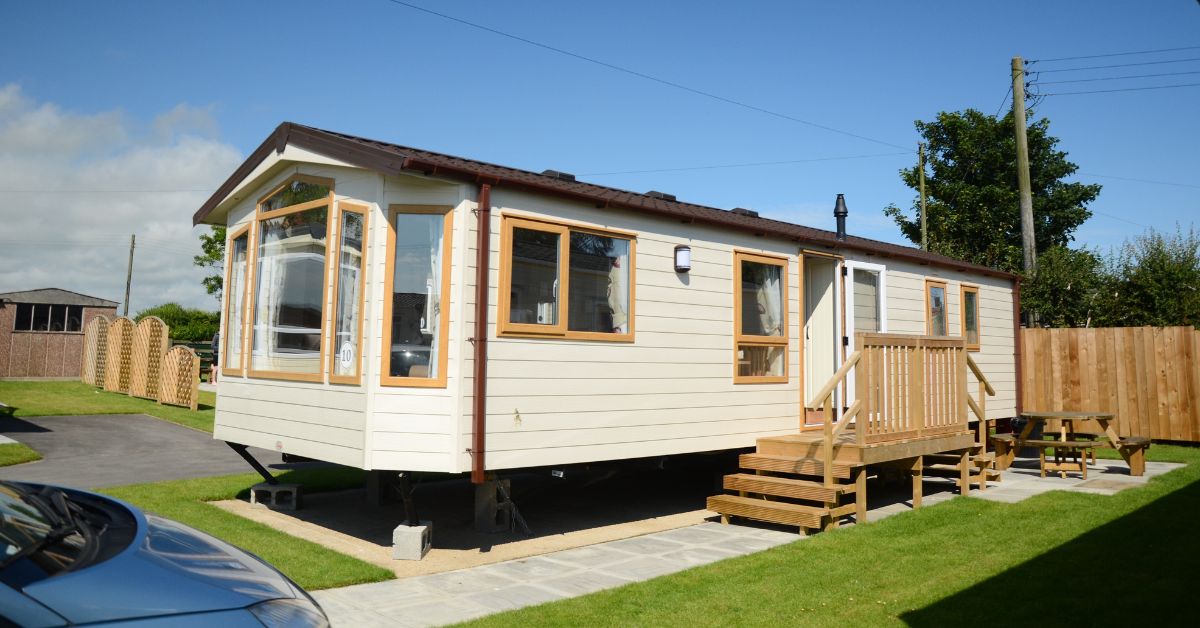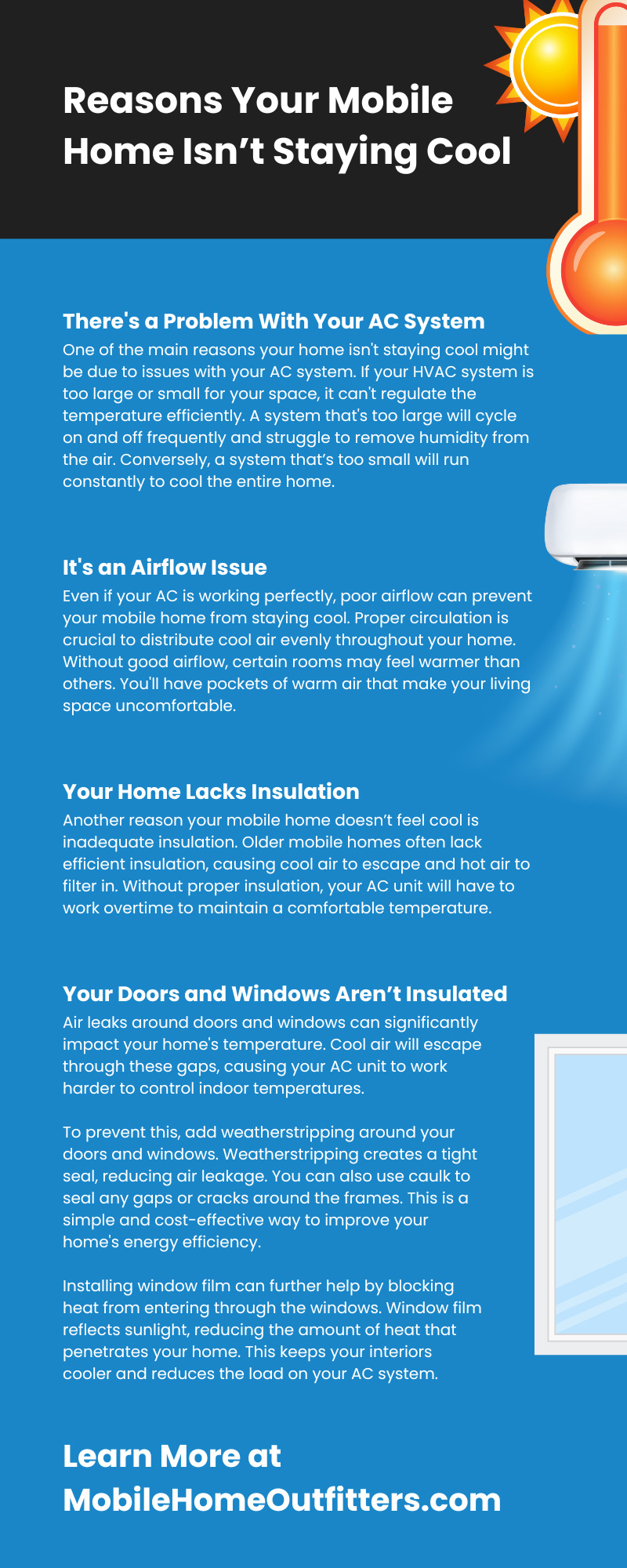
Keeping your mobile home cool can seem like a never-ending battle, especially during the hot months. If you've been scratching your head, wondering why your house isn't staying cool, you're not alone. Many mobile homeowners face this issue, often despite using air conditioning. We'll explore the various reasons your mobile home isn't staying cool and offer practical solutions to each one.
1. There's a Problem With Your AC System
One of the main reasons your home isn't staying cool might be due to issues with your AC system. If your HVAC system is too large or small for your space, it can't regulate the temperature efficiently. A system that's too large will cycle on and off frequently and struggle to remove humidity from the air. Conversely, a system that’s too small will run constantly to cool the entire home.
Another common issue is a leak in the refrigerant line. If your AC isn't blowing cold air, it could be due to a refrigerant leak. This not only prevents your unit from cooling efficiently but also forces it to work harder, consuming more energy. Additionally, thermostat problems can cause inefficient cooling. If your thermostat isn't reading the temperature correctly, it won't signal the AC to turn on or off at the right times. All these issues require maintenance from an HVAC professional.
Dirty filters and buildup in your ducts can also compromise your AC's efficiency. A clogged filter restricts airflow, while dust and debris in the ducts can block the cool air from circulating properly.
2. It's an Airflow Issue
Even if your AC is working perfectly, poor airflow can prevent your mobile home from staying cool. Proper circulation is crucial to distribute cool air evenly throughout your home. Without good airflow, certain rooms may feel warmer than others. You'll have pockets of warm air that make your living space uncomfortable.
To improve airflow, consider adding ceiling fans or portable fans. Ceiling fans help circulate the cool air, making your AC unit's job easier. Portable fans can provide additional cooling, especially in areas where the air seems stagnant. If you don't have AC, fans are even more essential to keep your home comfortable.
Improving airflow not only enhances cooling but also helps reduce energy consumption. When air circulates efficiently, your AC doesn't have to work as hard, leading to lower utility bills.
3. Your Home Lacks Insulation
Another reason your mobile home doesn’t feel cool is inadequate insulation. Older mobile homes often lack efficient insulation, causing cool air to escape and hot air to filter in. Without proper insulation, your AC unit will have to work overtime to maintain a comfortable temperature.
You can address this issue by adding spray foam insulation, fiberglass rolls, or foam board insulation. Spray foam insulation is particularly effective because it expands to fill gaps and cracks, providing a superior seal. Fiberglass insulation is a more traditional option, offering good thermal resistance. Foam board insulation is another excellent choice, providing high insulating value in a thin profile.
Investing in insulation will not only keep your home cooler in the summer but also warmer in the winter, improving overall energy efficiency.
4. Your Doors and Windows Aren’t Insulated
Air leaks around doors and windows can significantly impact your home's temperature. Cool air will escape through these gaps, causing your AC unit to work harder to control indoor temperatures.
To prevent this, add weatherstripping around your doors and windows. Weatherstripping creates a tight seal, reducing air leakage. You can also use caulk to seal any gaps or cracks around the frames. This is a simple and cost-effective way to improve your home's energy efficiency.
Installing window film can further help by blocking heat from entering through the windows. Window film reflects sunlight, reducing the amount of heat that penetrates your home. This keeps your interiors cooler and reduces the load on your AC system.
That said, upgrading your doors and windows is the most effective way to keep your home cool. In fact, most replacement windows for mobile home usage come with built-in weatherstripping and double-paned glass.
5. The Indoor Humidity Levels Are Too High
High humidity levels can make the air feel warmer than it is, making your home uncomfortable. Using a dehumidifier can help lower indoor humidity, making the air feel cooler and more pleasant.
A dehumidifier works by removing excess moisture from the air, reducing humidity levels. This helps if you have a window AC unit or no AC at all. By maintaining optimal humidity levels, a dehumidifier can enhance your AC's efficiency and create a more comfortable living environment.
Additionally, using exhaust fans in the kitchen and bathroom can help reduce humidity levels. These fans remove excess moisture generated from cooking and showering, preventing it from spreading throughout your home.
6. Your Home Gets a Lot of Sun Exposure
Sunlight streaming through your windows can significantly increase indoor temperatures, making it difficult to keep your home cool. While natural light is beneficial, too much sun exposure can make your mobile home feel like an oven.
Adding window blinds and keeping them closed on very sunny days can help block the heat. Blinds provide a physical barrier that prevents sunlight from entering your home. Using blackout curtains is another effective way to reduce indoor temperatures. Blackout curtains keep light and heat out, maintaining your home’s coolness.
Installing window awnings can also provide shade and reduce heat gain. Awnings extend over your windows, preventing sunlight from raising the temperature inside. Planting trees near your mobile home is another excellent way to create shade. Trees provide natural shade and can significantly reduce the amount of heat that reaches your home.
7. The Roof Absorbs Too Much Heat
Your mobile home’s roof plays a crucial role in regulating indoor temperatures. Heat can easily enter through the roof, making your home unbearably hot.
Consider adding insulation to the space between your ceiling and the roof to block more of the heat that radiates down. Insulating your roof helps keep your home cooler in the summer and warmer in the winter. If it's time to update your roof, consider choosing a lighter color for shingles. Light-colored shingles reflect more sunlight, reducing heat absorption.
If you have a metal roof, painting it with a cool roof coating can also help reflect sunlight. Cool roof coatings reflect more sunlight and absorb less heat, keeping your home cooler.
Understanding the reasons your mobile home isn't staying cool is the first step toward creating a more comfortable living environment. Whether it's an issue with your AC system, air leaks, or roof heat gain, there are practical solutions to address each problem. By taking these steps, you can improve your home's energy efficiency, reduce utility bills, and enjoy a cooler, more comfortable living space. Stay cool and make your mobile home a haven, no matter how high the temperatures climb.


